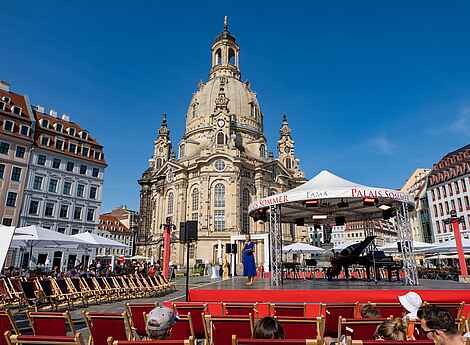Das, was hier geschieht, durch Liebe,
durch Freundschaft, inniges Einander-Verstehen,
das sind Bausteine, die da oben in der geistigen Region Tempel bauen,
und es muß für die Menschen, die diese Gewissheit durchdringt,
ein erhebendes Gefühl sein, zu wissen,
daß, wenn sich hier schon von Seele zu Seele Bande schlingen,
das die Grundlage ist eines ewigen Werdens.
Rudolf Steiner, GA 99
Living Steiner's ideas with joy and gratitude
On 22 June, Neumarkt, one of Germany's most important public squares, became a vibrant space showcasing the diversity of anthroposophical culture, set against the impressive backdrop of Dresden's Frauenkirche. The multifaceted programme included a children's choir performing 'Die Gedanken sind frei' (Thoughts are free), profound dialogues on the impulse of freedom and eurythmy, and insights into practical fields such as nursing, education and medicine. There was also a performance by the Dresden Waldorf School student band, which offered a vibrant expression of spiritual impulses amidst the urban landscape.
Like almost no other building, the Frauenkirche itself symbolises hope and reconciliation: an impressive symbol of reconstruction after its destruction in the Second World War, it embodies the power of a new beginning and the importance of peaceful coexistence. On this day, Dresden's Neumarkt became a place where the unifying power of culture, community, and spiritual awakening could unfold uniquely.
Not everyone can imagine bringing anthroposophy into the public sphere. And yet, isn't this exactly what is needed today? Could it be a balm for a time when people are threatening to drift apart, both mentally and socially?
Is it possible to speak the language of the people? Could we form a community, or would misunderstandings and criticism dominate? We did not know. It was precisely this uncertainty that was part of the journey. This uncertainty resonated throughout the preparation, which was based on the conviction that togetherness is possible if bridges are built. This was also evident at the event itself, which was filled with great joy and genuine gratitude, expressed by the performers on stage, the visitors, and the passers-by who paused to listen and join in.
In particular, people from the World Goetheanum Association network helped to build those bridges: Jens Heisterkamp, who moderated our PalaisGespräch; Börries Hornemann, the great-grandson of a co-founder of the first Waldorf school in Dresden; Monika Elbert, who supported the initiators' work with a leap of faith; and Jens Heisterkamp, who moderated our PalaisGespräch.
Silke Hohmuth and Vroni Much, info@kunst-des-sozialen.de
